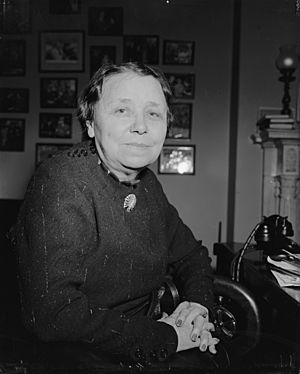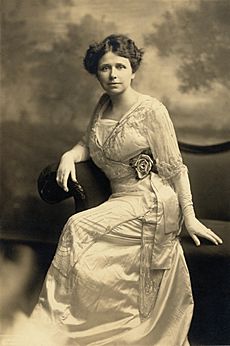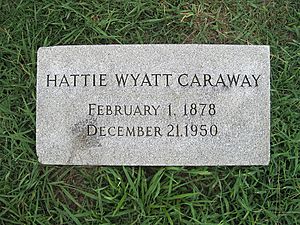Hattie Caraway facts for kids
Quick facts for kids
Hattie Wyatt Caraway
|
|
|---|---|

Caraway in 1940
|
|
| United States Senator from Arkansas |
|
| In office November 13, 1931 – January 3, 1945 |
|
| Preceded by | Thaddeus Caraway |
| Succeeded by | William Fulbright |
| Personal details | |
| Born |
Hattie Ophelia Wyatt
February 1, 1878 Bakerville, Tennessee, U.S. |
| Died | December 21, 1950 (aged 72) Falls Church, Virginia, U.S. |
| Political party | Democratic |
| Spouse |
Thaddeus Caraway
(m. 1902; died 1931) |
| Children | 3, including Paul |
| Education | Ebenezer College Dickson Normal College (BA) |
Hattie Ophelia Wyatt Caraway (born February 1, 1878 – died December 21, 1950) was an important American politician from Arkansas. She made history as the first woman ever elected to the United States Senate. She was also the first woman to serve a full term as a U.S. Senator and the first to be reelected. Hattie Caraway also had the honor of being the first woman to lead a session of the Senate. Her journey into politics opened doors for many women who came after her.
Contents
Early Life
Hattie Wyatt was born in a small, quiet area near Bakerville, Tennessee. Her father was a farmer and shopkeeper, and her mother was Lucy Mildred Burch. When Hattie was four, her family moved to Hustburg, Tennessee. Even though her family didn't have much money, Hattie dreamed of going to college. A kind aunt helped her achieve this dream.
After attending a small school and church, she went to Dickson Normal College. In 1896, she earned her Bachelor of Arts degree. She taught school for a while. In 1902, she married Thaddeus Caraway, whom she had met in college. They had three sons: Paul, Forrest, and Robert. Paul and Forrest later became generals in the United States Army.
The family settled in Jonesboro, Arkansas. Thaddeus started his law practice. Hattie took care of their children, managed the home, grew a garden, and helped with their cotton farm.
Later, the Caraways also had a home in Riverdale Park, Maryland. Thaddeus was elected to the United States House of Representatives in 1912. He served there until 1921, when he became a U.S. Senator. Hattie was interested in her husband's political work. However, she mostly stayed out of Washington D.C.'s social and political scene. She once said that after women gained the right to vote, she simply added voting to her other household duties like cooking and sewing.
U.S. Senator
In 1931, Thaddeus Caraway passed away while still in office. Following a tradition, Arkansas Governor Harvey Parnell appointed Hattie Caraway to fill his empty Senate seat temporarily. She officially started her role on December 9, 1931.
Making History in Elections
First Woman Elected to the Senate
In January 1932, with support from the Democratic Party in Arkansas, Hattie Caraway easily won a special election. This election was to finish the remaining months of her husband's term. By winning, she became the first woman ever elected to the Senate.
Running for a Full Term
In May 1932, Hattie Caraway surprised many politicians in Arkansas. She announced she would run for a full six-year term in the upcoming election. Many thought she would step aside for other candidates. She told reporters that it was time for women in politics to be seen as more than just temporary placeholders.
When she was asked by Vice President Charles Curtis to lead a Senate session, she used the chance to announce her plan to run for reelection. Senator Huey Long from neighboring Louisiana, a popular politician, actively supported her. He traveled to Arkansas for a week to campaign for her. Hattie Caraway was the first female senator to lead the Senate and the first to chair a committee. She accepted Long's help because she supported his ideas to help the poor and limit the wealth of the rich. Long's support helped her win many more votes than her closest opponent in the primary election.
Hattie Caraway then won the general election in November 1932. This was the same year Franklin D. Roosevelt became U.S. President.
Reelection in 1938
In 1938, Hattie Caraway faced a tough reelection campaign. Representative John Little McClellan challenged her. He argued that a man could better represent the state's interests. His campaign slogan was, "Arkansas Needs Another Man in the Senate!"
Despite this, Hattie Caraway received support from government workers, women's groups, and unions. She won a close victory in the primary election. She then won the general election with a large majority of the votes. This made her not only the first woman elected to the Senate but also the first woman to be reelected to the Senate.
Final Election in 1944
In 1944, Hattie Caraway ran for reelection again. However, she finished fourth in the Democratic primary. She lost to J. William Fulbright, a young and popular U.S. Representative and former president of the University of Arkansas. Many believe her loss was due to not being visible enough with the people she represented.
Her Time in the Senate
During her time as a Senator, Hattie Caraway worked on committees like Agriculture and Forestry, Commerce, and Enrolled Bills and Library. She even chaired the Enrolled Bills and Library committee. She cared deeply about helping farmers, controlling floods, and supporting veterans. These were all important issues for the people of Arkansas. She voted for almost all the programs of the New Deal, which were designed to help the country recover from the Great Depression.
In 1938, she joined other Southern senators in opposing a bill about certain serious crimes. She was careful in her Senate work but rarely spoke or gave speeches on the Senate floor. Some reporters called her "Silent Hattie" or "the quiet grandmother." She explained that she didn't want to take time away from the men, saying, "The poor dears love it so."
Hattie Caraway supported President Roosevelt's foreign policy. She spoke in favor of the Lend-Lease bill, which helped other countries during World War II. She spoke as a mother with two sons serving in the U.S. Army. While she encouraged women to help with the war effort, she also believed that caring for the home and family was a woman's main job.
However, she was aware of the challenges women faced. In 1931, when she was given the same Senate desk as the first widow appointed to the Senate, she privately joked, "I guess they wanted as few of them contaminated as possible." In 1943, she became the first woman lawmaker to support the Equal Rights Amendment. This amendment aimed to ensure equal rights for all Americans regardless of sex. In early 1944, she also supported the G.I. Bill, which helped soldiers returning from war get education and housing.
On her last day in the Senate, her male colleagues gave her a rare standing ovation. After leaving the Senate, President Roosevelt appointed her to the Employees' Compensation Commission. In 1946, President Harry S. Truman gave her a role on the Employees' Compensation Appeals Board. She served there until she became ill in January 1950. Hattie Caraway passed away on December 21, 1950, in Falls Church, Virginia. She was buried in Oaklawn Cemetery in Jonesboro, Arkansas.
Her Legacy
Hattie Caraway was a supporter of the prohibition movement, which aimed to ban alcohol. She generally supported the New Deal programs. By insisting on serving a full term and running for reelection, Hattie Caraway set an important example for women in politics. Even though she wasn't always at the center of power, her hard work and skill earned the respect of her fellow senators. She showed that political abilities were not just for men and encouraged more women to take on public roles.
On February 21, 2001, the United States Postal Service honored her with a special postage stamp. Her gravesite in Oaklawn Cemetery in Jonesboro, Arkansas, was recognized in 2007 on the National Register of Historic Places.
See also
 In Spanish: Hattie Caraway para niños
In Spanish: Hattie Caraway para niños
 | Aaron Henry |
 | T. R. M. Howard |
 | Jesse Jackson |



